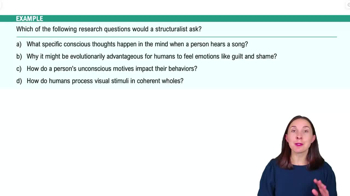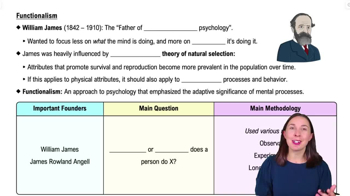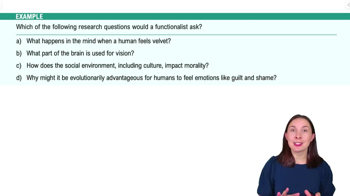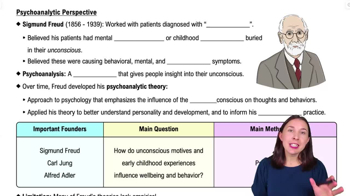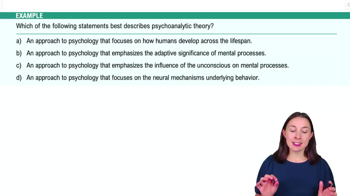Table of contents
- 1. Introduction to Psychology1h 43m
- 2. Psychology Research2h 20m
- 3. Biological Psychology2h 41m
- 4. Sensation and Perception28m
- 5. Consciousness and Sleep32m
- 6. Learning41m
- 7. Memory34m
- 8. Cognition37m
- 9. Emotion and Motivation35m
- 10. Developmental Psychology33m
- 11. Personality48m
- 12. Social Psychology41m
- 13. Stress and Health41m
- 14. Psychological Disorders44m
- 15. Treatment47m
1. Introduction to Psychology
Early Schools of Thought
Struggling with Psychology?
Join thousands of students who trust us to help them ace their exams!Watch the first videoMultiple Choice
___________ is considered the Father of Psychology.
A
Sigmund Freud.
B
John Locke.
C
William James.
D
Wilhelm Wundt.
 Verified step by step guidance
Verified step by step guidance1
Begin by understanding the historical context of psychology as a discipline. Psychology emerged as a distinct scientific field in the late 19th century.
Identify key figures in the development of psychology. Wilhelm Wundt is often recognized as the 'Father of Psychology' because he established the first psychology laboratory at the University of Leipzig in 1879.
Consider the contributions of Wilhelm Wundt to psychology. He is credited with separating psychology from philosophy by focusing on the study of the mind through experimental methods.
Compare Wundt's contributions with those of other figures mentioned: Sigmund Freud, known for psychoanalysis; John Locke, a philosopher who influenced psychology; and William James, a key figure in functionalism.
Conclude by recognizing that Wilhelm Wundt's establishment of the first experimental psychology lab marks a significant milestone, earning him the title 'Father of Psychology.'

 5:44m
5:44mWatch next
Master Structuralism with a bite sized video explanation from Hannah Gordils
Start learningRelated Videos
Related Practice



